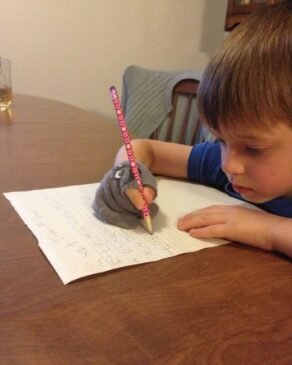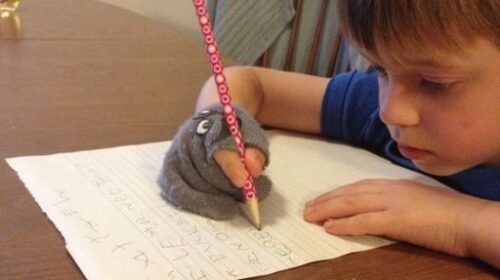At first, it was adorable.
My son Luca had always been creative, but when he slipped a googly-eyed sock onto his hand and said, “This is Mr. Scribbles. He helps me write,” I figured it was just a cute phase. He’d laugh, do his homework with the puppet, and even whisper little secrets into it when he thought I wasn’t looking.
I didn’t think twice—until he started asking for lined paper. Not for schoolwork. Just to “practice with Scribbles.”
Then the handwriting changed.
It wasn’t like Luca’s usual big, shaky letters. It was tighter. Neater. Like someone older was writing.
But only it wasn’t just neat—it was perfect. Curiously flawless, as though it had been written by a practiced hand. The letters were small, precise, and each one seemed so deliberate, so well-formed. At first, I thought it was a coincidence, maybe even a sign of Luca’s growing skill. But then, one day, I walked into the kitchen to find him hunched over the table, scribbling away with Mr. Scribbles in hand.
I paused, watching him. The words he was writing were beyond anything I had ever seen him attempt. They were in English, but they didn’t sound like the innocent musings of a 9-year-old.
“It’s all going to work out, isn’t it, Mr. Scribbles?” he whispered to the puppet, almost as if he was seeking reassurance.
I took a few steps closer, trying to read what was on the paper. It was a story, a kind of dark, mysterious tale about a boy who met a strange old man who promised him “a way out” of everything he ever hated. The words flowed so smoothly, almost as if they were coming from somewhere else, not from my son’s mind.
I thought about the puppet. Mr. Scribbles. What was going on here? I knelt down beside Luca and gently took the paper from his hands.
“What’s this, buddy?” I asked, trying to sound casual but feeling a rising sense of unease.
Luca turned and smiled up at me, but his smile was different this time. It was wide and knowing, as though he’d been keeping some secret from me. “Just a story, Mom,” he said softly. “Scribbles helps me.”

I stared at the words, trying to make sense of them. But my mind was racing. It wasn’t just the handwriting or the dark tone of the story that was unsettling. It was the feeling that I couldn’t quite put my finger on. Something about this whole thing didn’t feel right.
“I think we should talk about this more later, okay?” I said, trying to regain control of my own emotions. I didn’t want to freak Luca out, but I couldn’t ignore the growing sense of dread.
Later that evening, when Luca was tucked into bed, I decided to go through the papers he’d left on the table. There were more stories now—stories with the same eerie handwriting. Some of them didn’t even make sense. There were words that seemed to repeat, like “never forget,” and “darkness follows.”
Then, I found the last one. My heart stopped when I read the words:
The boy must make a choice. One door will lead to freedom. The other will lead to a place where nothing grows. The choice is his alone, but time is running out. He can feel the shadows closing in.
I couldn’t breathe for a moment. What was this? Why was Luca writing things like this? It was like the stories were coming from a completely different mind—someone older, someone who knew more than a child should.
In a panic, I rushed to the living room, where my husband, Matt, was watching TV.
“Matt, I need you to look at this,” I said, my voice shaking. I handed him the papers.
He glanced at them, then looked at me, confusion in his eyes. “What is this, really?” he asked, turning the pages. “It’s just… stories, honey. Kids are weird sometimes, you know?”
But I could tell that he didn’t understand the depth of my concern. This wasn’t just weird. This felt wrong. And the more I thought about it, the more I started to wonder if something else was going on—something I couldn’t explain.
The next day, I decided to speak with Luca’s teacher. Maybe she had noticed something unusual at school. When I arrived at the school, I found Mrs. Thompson in her classroom, grading papers. She greeted me warmly, but her expression grew more serious when I mentioned my son’s recent behavior.
“Well, to be honest,” she said, “Luca’s been a bit different lately. His work has changed, too. It’s like he’s a completely different kid. His writing, especially… it’s been so advanced. Sometimes I wonder where he’s getting all this from.”
“Advanced?” I repeated, my heart sinking.
“Yes. It’s not the usual stuff we work on in class. And it’s not just the writing. It’s like he’s… well, I don’t know how to explain it. Like he knows more than a child his age should.”
A chill ran down my spine.
“I’m worried,” Mrs. Thompson admitted. “He’s been drawing strange pictures, too. Like, dark, shadowy figures. But he won’t talk about it. Every time I try to ask him about it, he just smiles and says, ‘It’s all part of the game.’”
I stared at her, my mind racing. This wasn’t just some innocent phase anymore. Something was happening to Luca. Something that went beyond normal childhood imagination.
After leaving the school, I went straight home, my mind in a fog. I needed answers. I needed to understand what was happening to my son. I sat down at the kitchen table, staring at the pieces of paper that had started to pile up. I tried to piece together some kind of pattern, some clue.
Then it hit me.
The puppet. Mr. Scribbles. Had it always been there? I couldn’t remember. I searched the house, going room by room, until I found the old sock puppet tucked away in a drawer in Luca’s room. My hands trembled as I picked it up. There was something about the way it felt in my hands—like it was… alive.
Suddenly, I felt a cold gust of wind sweep through the room, though the windows were closed. The puppet seemed to stir, its googly eyes staring up at me. My mind raced. Could it be? Was this just a strange coincidence, or was there something more sinister at play?
Desperate for answers, I turned to the internet, searching for anything that might explain this. And then I found it. A bizarre, fringe theory about a phenomenon where objects—particularly dolls and puppets—could somehow tap into otherworldly forces, channeling the thoughts and intentions of other beings. The idea was absurd, but the more I read, the more it seemed like it could explain everything.
My hands shook as I clicked through articles and forum posts. Could it be that the puppet was somehow linked to this dark, mysterious force? Was it possible that it had taken control of Luca’s imagination—and his mind?
That night, I sat beside Luca’s bed, watching him sleep. His face looked so peaceful, so innocent. But deep down, I knew there was something lurking beneath the surface. Something I couldn’t understand.
It was then that I realized—the key to breaking this cycle wasn’t in controlling what Luca wrote or drew. It was in freeing him from whatever had taken hold of him.
The next morning, I took action. I didn’t tell Matt; I knew he wouldn’t understand. I carefully packed up all of Luca’s stories, the puppet included, and drove to a nearby shrine that I had heard about in passing. It was said to have a strange power, one that could dispel dark forces. I didn’t know if it would work, but I had to try.
As I stood there, watching the shrine in front of me, I made a silent vow to protect Luca no matter what it took. When I left the shrine, the stories stopped, the puppet was gone, and Luca returned to his usual self.
Weeks passed, and I never told anyone about the shrine. But I could feel something had shifted. It was as if Luca’s world had righted itself. And as for me? I had learned that sometimes, the answers come from the most unexpected places. And that protecting the ones we love doesn’t always follow the path we imagine.
If you’re going through something similar—whether it’s something unexplained or an emotional challenge—remember that sometimes the answers are hidden, waiting for us to uncover them. Never stop looking, and always protect what matters most.
Feel free to share this story if it resonated with you, and don’t forget to like the post if you believe in the power of trust and persistence.



